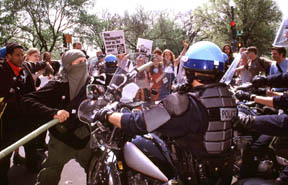|
 |
|
Whose
streets? Credit: Jim West
|
The Protest Next Time
By Laura Flanders
It isn't often that I agree with the editorial writers at the Washington Post. But on April 19, referring to the World Bank/IMF protests, the Post editorialized that the city should be "grateful" to Police Chief Charles
Ramsey. I agree. We have something to thank the police for. Not, as the Post would have it, "for the professional manner in which they handled the week-long protest." Rather, for they way, with batons, barricades and brutality, they gave some fledgling activists experiences shocking enough to bind them for the long haul to the movement for radical change.
Matt Ginsberg-Jaeckle, a 17-year-old high school senior from Boulder, Colorado, spent eight hours in water-soaked clothes and shackles, on a cold, concrete jail floor, denied food, water and use of a telephone. "I learned a lot more in that week than I would have learned in a million weeks of school," he told the Colorado Daily.
"We were told that a bunch of 'niggers and faggots' were going to rape us and beat us, and that we would get HIV and AIDS," he said. "If a bunch of mostly white people who had the whole world watching them were treated the way we were, the way the regular prisoners are treated must be unbelievable."
Similar stories are being heard everywhere, as 1,300 detainees return home, some of them having spent six days in conditions they call "outrageous." Many had signed up to protest, as Ginsberg-Jaeckle did, because they "firmly believed that it was our right to be represented in those [global finance] meetings."
Laura Flanders is a contributing editor of In These Times.
![]()
|
In These Times ©
2000
Vol. 24, No. 13 |
